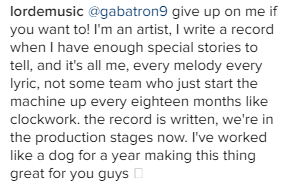Just when Frank Ocean fans were losing all hope, producer Malay weighed in with the stern reminder that “art cannot be rushed”. Elaborating on that point, he continued “It’s about making sure the perfect aesthetic for the situation has been reached. To do that takes constant tweaking, trial and error. That goes for any creative situation.”
As much as Ocean’s sophomore album, and the method of its belated arrival, have been thoroughly dissected, this statement struck me as interesting. From a creative standpoint, the idea that art cannot be accomplished to deadline holds a lot of water, but surely you would have to be fairly naive to believe that recording an album is a solely creative venture?
The concept of a profiteering, greed-founded music industry is hardly new. Label heads are still often imagined as cigar-smoking fat cats, wedged into their leather-bound chairs in their enormous and opulent offices; a safe distance from the actual music, but very close to the accounts. Of course, this is a caricature, but it does well to illustrate the perception of record labels as businesses first and foremost and patrons of creativity second.
Recent years have seen enough scrambling and maneuvering on the part of labels and publishers, trying to swing a decent profit from a rapidly changing industry, to convince even the most clueless onlooker that it is not all about the music. Which brings me to the question; do signed artists really have the freedom to create “art”?
Music history is littered with examples of artists suffering under contractual obligations from labels. Even this year, following Kesha’s battle with Kemosabe Records, we have seen how damaging and obstructive a binding record deal can be to an artist. It is also particularly common for artists to fall foul of their agreement to produce a specified number of releases.
A common term in recording contracts is a “minimum-delivery clause”, which states that the artists must produce a minimum number of releases during a certain time frame. Often with the caveat that the material is to be of acceptable quality to the label, this can safely be viewed as an assurance of return on investment. And the bottom line is that, to a label, an artist is an investment with a view to profit.
A musician and their work is essentially a commodity, owned and controlled to varying degrees by the record label. The label finances the artists, who’s product, in turn, then finances the label – and hopefully themselves. So once an artist has received the settlement as dictated by their contract, how long will a label wait to see a return on the money that they have put into that musician?
I find it hard to believe that either large or small corporations would happily cool their heels while one of their roster continually fails to release material. Is the appreciation for art really higher than the industry’s drive for profit?
History would indicate that the answer to that is no. There are too many bitter, disappointed recordings from artists forced into the studio by their contractual obligations. See The Rolling Stones’ Schoolboy Blues, more usually known as ‘Cocksucker Blues”, as a good example. And even when not purposefully sabotaged, material recorded under duress rarely seems to perform well.
So how did Frank Ocean manage to spend four years working on his follow up to Channel Orange? “Release dates” came and went, with radio silence from the Def Jam/Universal camp – which could hint at either an internal battle, or their blessing that Ocean take his own sweet time. But since the release of his visual album Endless and then Blond almost immediately after, it appears that maybe we were actually waiting for Frank to finish up some serious legal maneuvering.
It was reported that Def Jam paid out up to $2 million in recording costs for the forthcoming album from Ocean, at the time thought to be titled Boys Don’t Cry. Since then it has been suggested that the singer repaid those costs via outside investors and severing his ties to Def Jam and its parent, Universal, buying back his recordings and paving the way for his own label venture. So while Endless fulfilled his previous obligations with UMG, the “proper” album Blond, a completely separate entity, by far overshadowed what was essentially an extended music video.
After four long years, Def Jam and Universal are stuck with an “album” that is not available for sale, while Ocean effectively won a much bigger stake in profits from his already hugely successful sophomore record. Released just twenty four hours later as an Apple Music exclusive, UMG reacted quickly by placing a ban on any future streaming exclusives via any of its labels. But not before losing out on one of the biggest releases of 2016.
On the other less cynical hand, critics have argued that Blond stands as a true testament to why musicians should not be rushed. The term “mass produced” is often applied to modern music, a byword for a lesser product, negatively casting a baleful eye at manufactured bands and shows like The Voice. If fast food is the lowest point on the scale for gourmets, then formulaic, mass produced music might place similarly for music lovers.
Fans may have become irritated with Ocean’s apparent laissez-faire attitude, as he cruised parties and global destinations rather than staying chained to the studio. Explaining his hiatus with the flimsy excuse that he was simply off having a good time, actually, it may be that all that “living” made Blond what it is.
Similarly, New Zealand pop star Lorde has come under fire for the time it has taken her to release her second album. Although she has assured nagging fans that it is written and in production stages, it is worth remembering that Lorde is only nineteen. If “art” is to be the expression of meaningful and worthy subject matter, shouldn’t artists be allowed the time to bring together something that is actually worthwhile?
From both sides, there is an argument for musicians not to be pressurised into releasing material before they deem it to be ready. Creatively, a second rate job will hardly win fans or acclaim for their career. Being forced to release substandard material can surely only have a negative affect on an artist. And from a business standpoint, as Blond demonstrated, a perfectly finished article will perform regardless of delay. Imagine the damage to Ocean’s career if such a long awaited record had disappointed.
Record deals are still highly confidential, so we have no way of knowing if these artists truly have labels breathing down their necks for releases. And perhaps it is the ease of music consumption today, with online streaming, that throws the waiting period into such sharp relief? Demand is definitely high, from all sides, which is why it is so important that quality matches up to the expectation.
Image: Hongkiat



